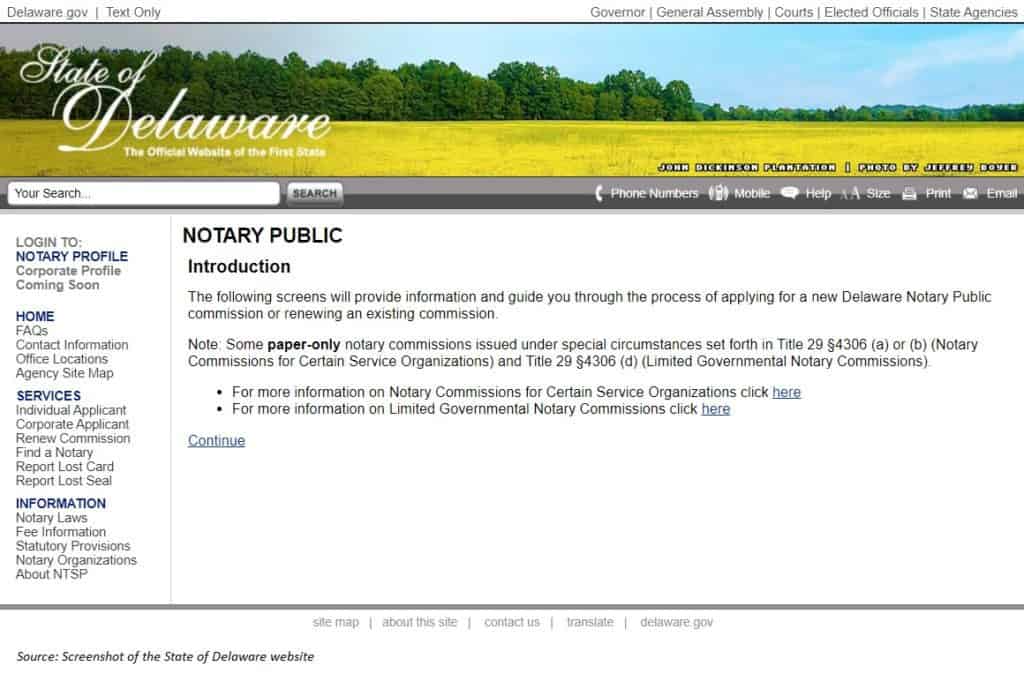(**) Disclosure: This post may contain affiliate links, meaning RealEstateCareerHQ.com will get a commission if you decide to make a purchase through the links, but at no additional cost to you.
To become a notary loan signing agent in Delaware, an applicant must submit an online Notary Public application to the Delaware Secretary of State, pay the $60 filing fee, purchase the notary seal and other business supplies.
Although you could work on different types of documents, the loan signing business in the real estate market seems to be a lucrative niche.
So what does a loan signing agent do? When people are getting a mortgage to purchase a house, or they need to refinance their property, there will be loan documents involved. Your role as a notary loan signing agent is to walk through the set of loan documents with the borrower and witness them in signing the paperwork.
You would also need to verify the identity of the signers, place the notary stamp on the signed documents, then send them back to the signing services company or closing attorney.
But keep in mind that you should NOT be providing legal advice, and you cannot explain the terms of the loan documents to the borrower.
In this guide, you’ll learn the steps to become a notary signing agent in Delaware, income updates, and FAQ about this profession.
But before we start, I want to give a brief disclaimer. This post is not intended as legal advice or state/federal notary public training. It is for general information only. Please check with your state to be sure that loan signing agents are utilized in the closing process. Always follow your state’s notary laws and best practices.
Would you like to learn how to make $75 to $200 per signing appointment? You must check out the Loan Signing System from Mark Wills. (**) This is one of the best training programs for loan signing agents. Many students have achieved remarkable business success after taking this program.
5 Steps to Become a Notary Loan Signing Agent in Delaware

Step 1: Meet the basic requirement
- At least 18 years of age
- Good character and reputation
- Have a legal residence/ maintain an office/ regular employment in Delaware
- Have a reasonable need for a notary commission
Step 2: Submit the notary commission application to the Delaware Secretary of State
The Delaware Secretary of State is the office that grants the notary commission to applicants and maintains records of all notaries public in Delaware.
You need to submit an online notary commission application to the Delaware Secretary of State. To do so, you first need to create a Notary Profile on their website.

Most of the questions on the application are pretty strict forward—for example, your name, business address, background info. Make sure the name on the application will be the same as when you are notarizing documents.
There is a $60 application fee and. They can be paid by a credit card or electronic check (ACH) from a personal or business checking account.
Step 3: Take an oath of office

If your application is approved, the DE Office of the Secretary of State will issue the notary commission. To my understanding, they will notify you through email.
After you receive the Notary Commission Certificate, you should review and make sure all the details are correct. (e.g., your name, county of residence, commission dates).
Then you will get an oath of office in front of a notary public or an officer that is authorized to administer oaths. Once that is done, you should return a copy of the oath to the Delaware Secretary of State.
Step 4: Get a notary seal

To start the notary signing business in Delaware, you must have a notary seal. This helps you to include specific info in every document so you won’t leave out any required details.
You may purchase the notary seal from office supplies store. Also, its design must comply with the regulatory rules.
It must be either a metal embossing seal or a black-inked rubber stamp, must contain the notary’s name exactly as it appears on the commission, and must contain the words “My Commission expires on” and the commission expiration date, and the words “Notary Public” and “State of Delaware”…
Quote from Delaware Secretary of State – FAQ
You must keep the notary seal in a locked and secured area, where only you have direct and exclusive control of it. (e.g. a locked drawer or cabinet.)
Step 5: Maintain a good record of business practice with a notary journal

As a notary signing agent in Delaware, the State law does not require you to keep a business journal.
However, maintaining a good record of your notary acts is an essential part of good business practice. It could serve as proof that you have taken reasonable steps to identify the signer of a document. That is why many notaries would keep a business journal.
It is better to have one bounded with pre-printed pages. You may find it at stationery, office supply stores, or through notary associations.
For the states that require notary signing agent to maintain a journal, they typically would recommend taking notes of the following:
- Name and address of the signer;
- Date of the notarization;
- Method by which each person was identified to the notary;
- Type of official act (oath or affirmation, acknowledgment, protest, notary as an official witness);
- Type of document involved (deed, mortgage, lease, motor vehicle form, deposition, etc.);
- The fee charged; and
- Signature(s) of person(s) signing document.
Furthermore, it is better to retain the journal for a reasonable period. Some states would require a notary signing agent to keep them for at least ten years.
Can you digitally notarize a document in Delaware?
You can e-notarize a document in Delaware. eNotarization is where you notarize an electronic document using an electronic signature and electronic seal. However, you still need to meet the signer face-to-face.
Frankly, I prefer states that have the option for notaries to work digitally. This can bring you tremendous convenience to streamline your notary practice.
In making sure that the electronic documents are handled securely, you must use a technology service provider approved by the Delaware Secretary of State. This is called Notary Technology Service Provider. (NTSP).
As I’m reading their SOS website now, I believe they are still trying to implement rules for eNotarization. Therefore, they are not issuing eNotary commission for now, and there isn’t an NTSP list yet.
You may want to check out the Secretary of State website and see if there’s any update.
Here’s a Snippet of What Stephanie Espinal Think about Being a Notary Signing Agent!

“My advice is that don’t be afraid to start the loan signing career on a part-time basis. I would also tell them that they need to be passionate about the profession and not just because of the money. They must dedicate their time to learning the business and notarial laws from your state.
You will be working with people’s financial lives and any mistake you make with cause them a lot of money.”
– Stephanie Espinal, Notary Loan Signing Agent
Here’s an exclusive interview with Stephanie. In there, she shared what it takes to be a notary signing agent as a side gig, her valuable journey, and secret sauce to success.
Can I perform remote online notarization in Delaware?

Remote online notarization allows you not to be physically present with the signer. Instead, you would verify their the signer’s identity through video and audio conference.
At the time I’m writing the post, there are emergency rules imposed in many states, which allows remote notarization. The good news is Delaware is one of them.
Effective April 15, 2020 at 8:00 p.m. E.D.T., any notarial act required under Delaware law is authorized to be performed, in addition to methods authorized under current law, by utilizing audio-visual technology (remote notarization) provided that the following conditions are met:
a. The notarization is performed by a licensed Delaware attorney who is in good standing with the Supreme Court of Delaware (an “Authorized Notarial Officer”);
b. The Authorized Notarial Officer and all persons whose signatures are being notarized shall be physically located in Delaware (but each may be in different physical locations), and the signer(s) shall affirmatively represent this fact during the video conference;
c. The Authorized Notarial Officer shall determine that the person whose signature is being notarized is the person whose true signature is on the instrument: 1) by personal knowledge of identity, or 2) by examining one document that is satisfactory evidence of identity as provided in 29 Del. C. §4321(21) (an “Identity Document”). For documents notarized in relation to a real estate transaction or conveyance of real property, the attorney overseeing the transaction shall verify the signer’s identity in one of the following ways: 1) by personal knowledge of identity; 2) by examining two Identity Documents; or 3) by examining one Identity Document and one document postmarked or dated within 60 days from the date of the notarization (i.e. utility bill, cable bill, voter registration card, etc.) that includes the signer’s name and address as stated on the Identity Document;
i. The verification of identity shall occur during the video conference; not merely by transmitting the identity evidence before or after the video conference; and
d. The Authorized Notarial Officer is able to communicate in real-time by any available video conferencing method where the Authorized Notarial Officer can actually see, hear and communicate with the person whose signature is being notarized.
Delaware.gov – Eleventh Modification: State of Emergency Declaration
However, this could be a temporary measure due to the emergency. But whether they would revert to in-person notarization afterward is unknown yet. Therefore, you should check with the Secretary of State.
If you want to know how can you work from home as a notary? The tools that you’ll need in your home office. Here’s the post for you.
How much can you make as a notary signing agent in Delaware?

The average annual income of Loan Signing Agent in Delaware is $44,263. The income typically ranges between $28,222 and $57,385. Top earning loan signing agents in Delaware are making over $85,608.
Top 10 Highest Paying Cities for Loan Signing Agents in Delaware
| City | Annual Salary |
|---|---|
| Milford | $51,425 |
| Hockessin | $49,815 |
| Bear | $49,306 |
| Ocean View | $47,644 |
| Newark | $47,416 |
| Wilmington | $46,051 |
| Dover | $45,526 |
| Middletown | $44,123 |
| Glasgow | $43,353 |
| Lewes | $43,094 |
As mentioned earlier, you could work on different documents, but the loan signing in the real estate market could be a lucrative niche.
Can you make over $10,000/month as a loan signing agent? Be sure to check out our notary earning guide. You’ll find a case study where a loan signing agent has built her business to such a successful figure.
(+) Source: Salary.com – June 28, 2020
Is there demand for notary loan signing agent in Delaware?
As long as people are obtaining mortgages or refinancing their homes, there would be a demand for loan signing agents.
All originated mortgages in Delaware
| YEAR | All originated mortgages |
|---|---|
| 2017 | 24,719 |
| 2016 | 27,296 |
| 2015 | 24,062 |
| 2014 | 19,181 |
| 2013 | 30,167 |
| 2012 | 32,868 |
| 2011 | 24,377 |
| 2010 | 26,997 |
| 2009 | 32,995 |
| 2008 | 27,619 |
| 2007 | 40,053 |
Source: Consumer Financial Protection Bureau – Home Mortgage Disclosure Act (HMDA) (July 16, 2020)
Some states are “Attorney States,” which means only attorneys can coordinate the closing paperwork. Whereas, others are “Escrow States” where escrow companies would handle the mortgage closing.
According to the First American Title, Delaware is a an “Attorney State.” Here is a post that talks more about the differences escrow states and attorney states. And how would it impact your loan signing business?
If you want to succeed in the loan signing industry, you must check out this loan system training program. If you review the testimonials of his students, you’ll be amazed at how the notary career changes their life after they learned from Mark Wills. (**)
What education do you need to become a Delaware notary signing agent?

There is no education requirement to become a notary signing agent in Delaware.
But to achieve the best business practice in this profession, it is always good to equip yourself with notarial knowledge. A helpful resource is the FAQ page on the Secretary of State website. It pretty much covers most of the things you need to know about being a notary in Delaware.
Another one is the Statutory Provisions, Title 29, Chapter 43. It covers the following topics:
Subchapter I. Office and Duties.
4301. Appointment of notaries in general; qualifications; revocation.
4302. Appointment of electronic notaries; term.
4303. Appointment of certain officers as notaries; term.
4304. Appointment of notary for each bank or branch.
4305. Appointment of court reporters as notaries public.
4306. Appointment of notaries for certain service organizations; limited governmental notaries; limitations.
4307. Term of office; fees; resignation.
4308. Oath.
4309. Seal and powers.
4310. Engraving of seal; effect of use of nonconforming seal; electronic notarial seal; notary’s official signature; electronic signature.
4311. Fees for services.
4312. Special fee provisions for certain services to members of the armed forces and to veterans; penalties; jurisdiction of justices of peace.
4313. Commission; signature of Governor; seal.
4314. Official electronic journal of notarial acts.
Subchapter II. Notarial Acts.
4321. Definitions.
4322. Notarial acts.
4323. Same – Acts in this State.
4324. Same – Acts in other jurisdictions of the United States.
4325. Same – Acts under federal authority.
4326. Foreign notarial acts.
4327. Certificate of notarial acts.
4328. Short forms.
4329. Electronic certificate of authority.
Quote from Statutory Provisions, Title 29, Chapter 43
How much does it cost to become a notary in Delaware?

It would cost approximately $92 to become a notary in Delaware.
Here’s a breakdown of the costs to start a notary signing business
| Notary Application | $60 |
| Notary Stamp | $17 |
| Journal | $15 |
There could be other expenses involved, E&O insurance, travel expenses, car maintenance, auto insurance, remote notary technology, laptop and other business supplies.
Can a felon be a notary signing agent in Delaware?

Having a conviction for a felony may impact the application to become a notary signing agent in Delaware. The DE Secretary of State needs to make sure that you are a person with credibility, truthfulness, and integrity to fulfill the responsibilities of the position.
But having a felony does not necessarily mean your application will automatically be declined. It depends on the severity and nature of the conviction. The Delaware Secretary of State would review it on a case-by-case basis.
Individuals convicted of a felony who have not had their rights restored as well as applicants convicted of a crime involving dishonesty or moral turpitude are not eligible for a Delaware notary commission.
Quote from Delaware.gov – Notary Public
How long does it take to become a notary signing agent in Delaware?

One thing I like about their online system is how it could streamline the entire application process. This eliminates the cumbersome signature process and mailing time. Once the Secretary of State approves your application, you receive the commission certificate within minutes.
Then it would depend on how long it takes you to get an oath of office before a notary public.
So give or take, you can become a notary signing agent in Delaware within a few days.
How to renew notary commission in Delaware?
The first commission term will only last two years, and then you will need to renew it. But you will have options to renew it for another two or four years.
If you have already created the notary profile on the Secretary of State website, they should notify you around 30 days that your current commission expires. Once again, the renewal can be done through their online system.
The renewal fee for 2 years is $60, and $90 for the 4 years term. By then, you would need to get a notary seal with a new expiry date.
To avoid an interrupted business period, begin the renewal process in advance. Don’t wait till your current notary commission is expired.
Can a Delaware notary notarize out of state?
No, a Delaware notary cannot perform notarization out of state.
Can I notarize for a family member in Delaware?

You must not notarize any documents where you have any financial or beneficial interest in the transaction. Therefore, notarizing a document for any family member could call into question, and such practice should be avoided.
I have more questions about being a notary signing agent in Delaware, where could I obtain more details?
You may contact the Delaware Secretary of State:
- Email: notary@delaware.gov
- Phone: 302-739-4111
If you are reading up to this point, I bet you must be interested in the notary signing profession. But why reinvent the wheel when there is a proven system that works? Many students had great success following the Loan Signing System (LSS) from Mark Wills. You may click here to check it out yourself. (**)
Disclaimer: The information in this post is for general information only, and not intend to provide any advice. They are subjected to change without any notice, and not guaranteed to be error-free. Some of the posts on this site may contain views and opinions from individual not related to JCHQ Publishing. They do not necessarily reflect our view or position.
(**) Affiliate Disclosure: Please note that some of the links above are affiliate links, and at no additional cost to you. Our company, JCHQ Publishing will earn a commission if you decide to make a purchase after clicking on the link. Please understand that we include them based on our experience or the research on these companies or products, and we recommend them because they are helpful and useful, not because of the small commissions we make if you decide to buy something through the links. Please do not spend any money on these products unless you feel you need them or that they will help you achieve your goals.
Reference:
- First American Title- Your Guide to Real Estate Customs by State (source)
- Delaware Secretary of State
- Delaware.gov – Eleventh Modification: State of Emergency Declaration (source)
- ZipRecruiter (source)
- Salary.com – Notary Signing Agent Salary in Delaware (source)
- Consumer Financial Protection Bureau – Home Mortgage Disclosure Act (HMDA) (source)

